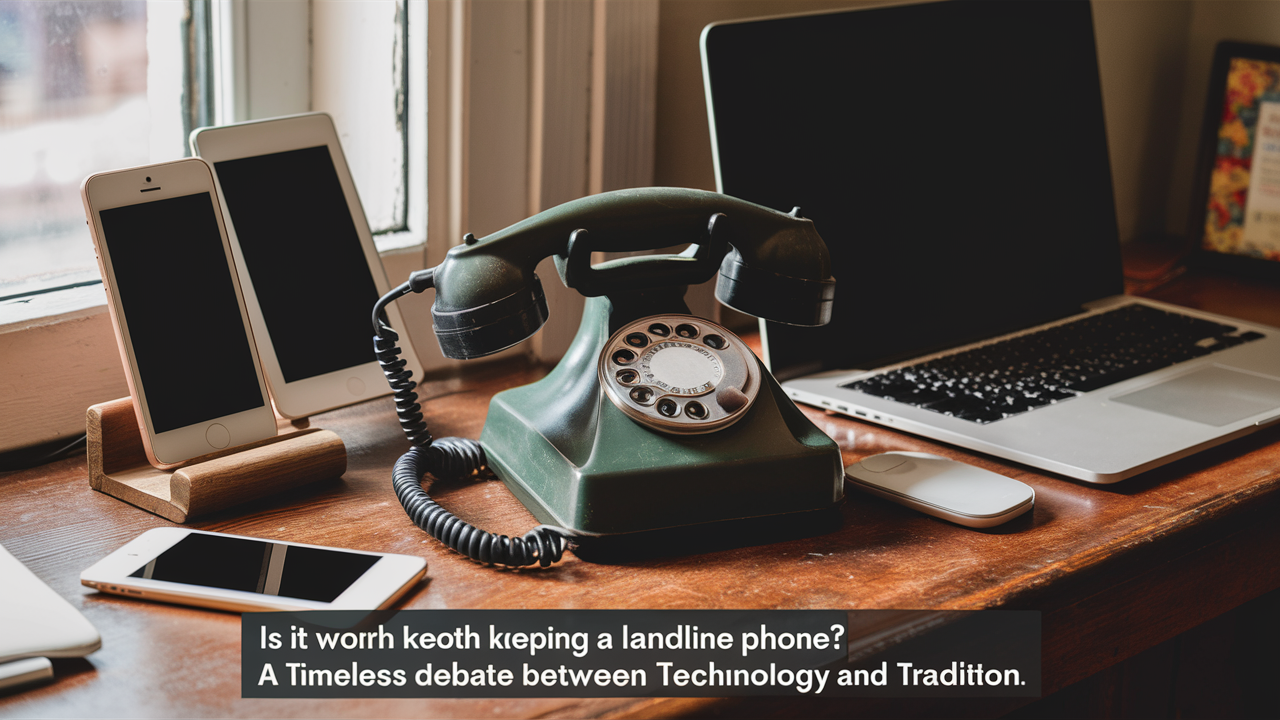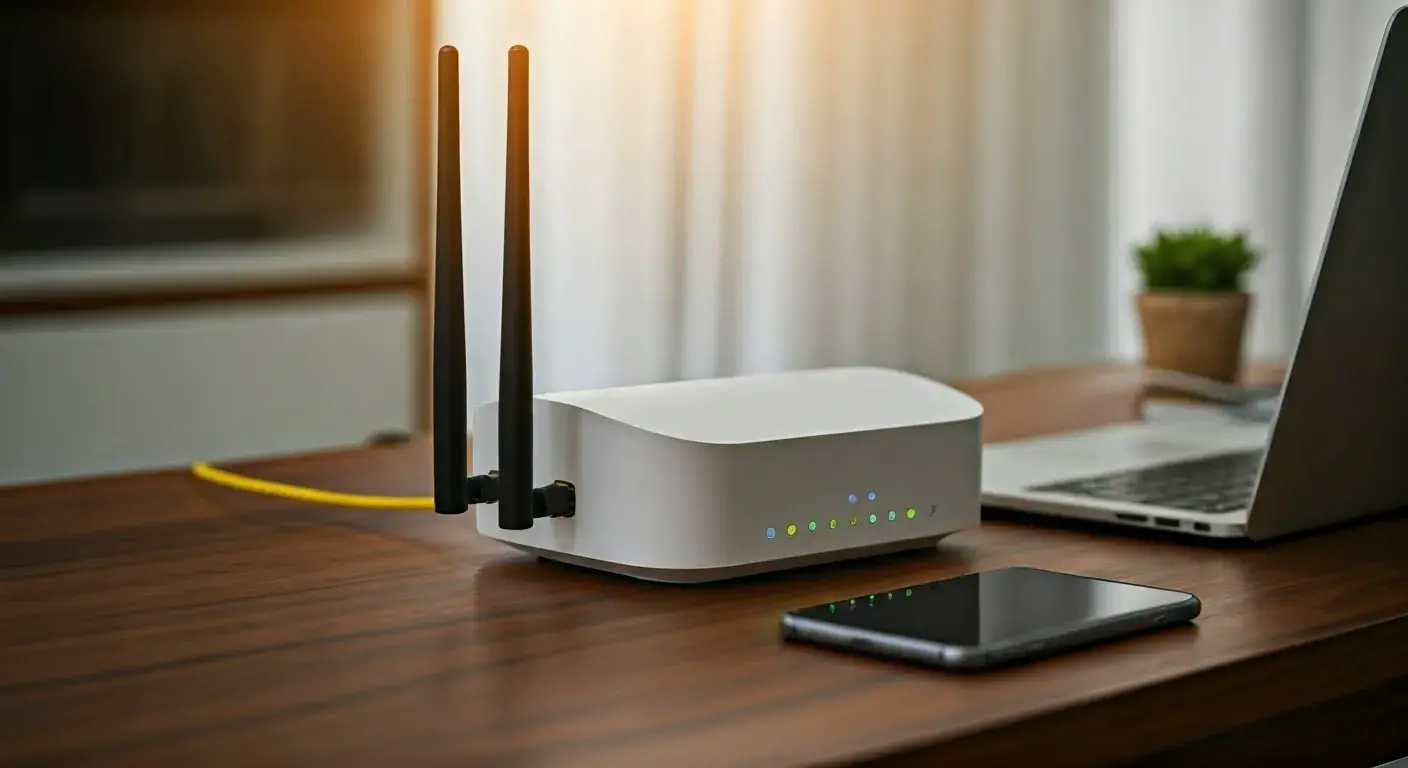Is it worth keeping a landline phone?

Deciding whether to keep your landline phone in 2025 involves weighing nostalgic comfort against modern convenience and cost. This guide explores the evolving role of landlines, comparing them to mobile alternatives to help you make an informed, cost-effective decision.
Introduction: The Enduring Question of the Landline
In an era dominated by smartphones and instant digital communication, the humble landline phone often feels like a relic of a bygone era. Yet, for many households, the decision to disconnect their traditional phone service isn't a simple one. This comprehensive analysis delves into the question, "Is it worth keeping a landline phone?" by examining its current relevance, comparing it to mobile alternatives, exploring its unique benefits, and offering a clear cost-benefit analysis for 2025. We aim to provide you with the insights needed to determine if a landline still holds a valuable place in your home.
The Enduring Appeal: Why Some Still Keep Their Landline
Despite the ubiquitous nature of mobile phones, a significant portion of households still maintain a landline connection. This persistence isn't solely due to habit; several compelling reasons contribute to the landline's continued existence in 2025.
Reliability and Stability
One of the most significant advantages of a landline is its inherent reliability. Unlike mobile phones, which rely on cellular signals that can be weak or unavailable in certain areas, landlines operate on a physical wire connection. This makes them less susceptible to network congestion or power outages that can cripple mobile service. In emergencies, a stable landline connection can be a lifesaver.
- Power Outages: Traditional landlines often draw power directly from the telephone network, meaning they can function even when your home's electricity is out. This is a critical distinction from VoIP or mobile phones, which require a charged battery or local power.
- Signal Strength: In rural areas or buildings with thick walls, mobile reception can be spotty. A landline provides a consistent, clear connection regardless of external signal interference.
- Network Resilience: The physical infrastructure of landlines is generally more robust against widespread network failures compared to the more complex, software-dependent mobile networks.
Call Quality
Many users report that landline calls offer superior audio clarity compared to mobile calls, which can sometimes suffer from dropped connections, static, or echoes. The dedicated line ensures a more consistent and often clearer voice transmission.
Simplicity and Ease of Use
For certain demographics, particularly older adults or those less technologically inclined, landline phones offer a straightforward and familiar communication method. The absence of complex menus, apps, or internet connectivity makes them easy to operate.
- Intuitive Design: Simple buttons and clear displays are standard on most landline phones, making them accessible to users of all ages and technical abilities.
- No Learning Curve: Unlike smartphones that require regular updates and learning new interfaces, landline phones remain consistently easy to use.
Security and Privacy
While not entirely immune to all forms of interception, landlines are generally perceived as more secure for voice communication than mobile phones, which can be vulnerable to more sophisticated hacking methods. Furthermore, many users appreciate that landlines don't track location data in the same way smartphones do.
Bundling Opportunities
Telecommunication companies often offer bundled packages that include landline service along with internet and television. For some households, bundling can lead to cost savings compared to purchasing these services separately. This can make keeping a landline seem more economically viable.
Emergency Services (911)
A significant advantage of landlines is their direct connection to emergency services. When you dial 911 from a landline, your location is automatically and accurately transmitted to the dispatcher, which is crucial in critical situations. While mobile phones now have enhanced 911 capabilities, the accuracy and immediate identification from a landline are still considered superior by many emergency responders.
Reduced Distractions
In an age of constant notifications and digital bombardment, a landline offers a more focused communication channel. It's not tied to social media, email, or games, allowing for more intentional conversations.
Dedicated Line for Specific Needs
Some businesses or individuals might require a dedicated, separate phone line for specific purposes, such as a home office, a security system, or a medical alert device. A landline can fulfill this need effectively.
The Declining Relevance: Arguments Against Keeping a Landline
While landlines retain some advantages, their drawbacks are becoming increasingly pronounced in the digital age. The shift towards mobile-first communication has rendered the landline less essential for many.
Cost
Monthly landline service fees can add up, especially when compared to the cost of mobile plans that often include unlimited calling and texting. When considering the cost of the phone itself and installation, the financial outlay can be significant, particularly if the landline is rarely used.
- Monthly Fees: Basic landline plans can range from $20 to $50 per month, depending on the provider and features.
- Equipment Costs: While basic phones are inexpensive, feature-rich cordless systems can cost upwards of $100.
- Lack of Features: Compared to smartphones, landlines offer very limited functionality, often lacking caller ID, voicemail, or call waiting unless added as extra-cost features.
Limited Functionality
Landlines are primarily for voice calls. They cannot send texts, browse the internet, access apps, or make video calls, all of which are standard features on modern smartphones. This limited utility makes them redundant for many users who rely on their mobile devices for all communication needs.
Portability
The inherent lack of mobility is a major disadvantage. A landline is tethered to a specific location, making it impossible to use when you're away from home. This contrasts sharply with mobile phones, which offer communication freedom anywhere with a signal.
Declining Infrastructure and Support
As fewer people subscribe to landline services, providers are increasingly phasing out copper-wire networks in favor of digital and fiber optic technologies. This can lead to reduced maintenance, slower service upgrades, and eventually, the discontinuation of landline services in certain areas.
Redundancy with Mobile Phones
For most individuals and families, a smartphone serves as their primary communication device. It handles calls, texts, emails, social media, and much more. Having a landline in addition to a mobile phone often means paying for a service that is largely duplicated, leading to unnecessary expenses.
VoIP Alternatives
Voice over Internet Protocol (VoIP) services offer a modern alternative to traditional landlines. They use your internet connection to make calls, often at a lower cost, and can provide features like call forwarding, voicemail-to-email, and international calling at competitive rates. Many VoIP services can also be used on the go via apps, blurring the lines between landline and mobile.
Number Portability Issues
While number portability is generally available, transitioning a landline number to a mobile or VoIP service can sometimes be complex or incur fees. This can be a barrier for those who wish to keep their long-standing landline number but move to a more modern service.
Environmental Impact
The infrastructure required for traditional landlines, including copper wiring and physical exchanges, has a significant environmental footprint. While modernizing infrastructure, the continued reliance on older systems can be seen as less sustainable compared to the more integrated digital ecosystems of mobile and VoIP.
Landline vs. Mobile: A 2025 Comparison
To truly assess the worth of a landline, a direct comparison with mobile phone services in 2025 is essential. The landscape of telecommunications has evolved dramatically, making this comparison more nuanced than ever before.
| Feature | Traditional Landline (2025) | Mobile Phone (2025) | VoIP Service (2025) |
|---|---|---|---|
| Primary Use | Voice calls, emergency services | Voice calls, texting, internet, apps, video calls, navigation | Voice calls, texting (often), internet access (via app), advanced features |
| Reliability | High (power outage resilient, stable connection) | Moderate to High (depends on signal, battery life) | Moderate to High (depends on internet connection stability) |
| Call Quality | Generally Excellent | Good to Excellent (can be affected by signal) | Good to Excellent (can be affected by internet bandwidth) |
| Portability | None (fixed location) | High (anywhere with signal) | Moderate to High (usable anywhere with internet, often via app) |
| Cost (Monthly) | $20 - $50+ (basic service) | $30 - $100+ (plans vary widely, often include data) | $10 - $40+ (often bundled with internet) |
| Emergency Services (911) | Automatic, precise location | Enhanced 911 (location accuracy improving but can vary) | Location often requires manual input or setup, accuracy can vary |
| Features | Basic (caller ID, voicemail often extra) | Extensive (apps, internet, camera, GPS, etc.) | Advanced (call forwarding, voicemail-to-email, conferencing, etc.) |
| Power Dependence | Low (network powered) | High (battery dependent) | High (internet modem/router and device dependent) |
The Smartphone Advantage
In 2025, smartphones are no longer just phones; they are personal computers in our pockets. They integrate all communication needs, entertainment, productivity tools, and access to information. For the vast majority of users, a smartphone alone is sufficient for all their communication requirements, making a separate landline service redundant and an unnecessary expense.
The Rise of VoIP
VoIP services have significantly eroded the landline market. Companies like RingCentral, Ooma, and even major ISPs offer VoIP solutions that are often cheaper, more feature-rich, and more flexible than traditional landlines. Many VoIP services allow you to use your existing landline number, porting it over seamlessly. Some even offer mobile apps that let you make and receive calls from your home number on your smartphone, effectively giving you the best of both worlds.
Bundling vs. Standalone Costs
While bundling can make landlines seem attractive, it's crucial to analyze the true cost. Often, the perceived savings from a bundle are minimal, and you might be paying for a landline service you rarely use. Separating services and comparing standalone mobile or VoIP plans with internet and TV packages can reveal more cost-effective options.
Emergency Services: A Critical Distinction
The most significant remaining advantage of a landline is its unwavering reliability for 911 calls. While mobile E911 has improved, dispatchers still rely on the precise, fixed location data provided by landlines. If you have elderly family members, individuals with medical conditions, or live in an area with poor mobile reception, this factor alone might justify keeping a landline.
Niche Applications and Essential Roles for Landlines
Beyond general communication, landlines continue to serve critical functions in specific scenarios where their unique characteristics are indispensable. These niche applications highlight why the landline isn't entirely obsolete.
Medical Alert Systems
Personal emergency response systems (PERS), often used by seniors or individuals with health concerns, frequently rely on landline connections. These systems, activated by a button worn by the user, transmit an emergency signal directly to a monitoring center. While some newer PERS devices use cellular technology, many still depend on the robust and reliable connection of a traditional landline, especially in areas with weak mobile signals.
Example: A user falls at home and presses their medical alert pendant. The device sends a signal via the landline, immediately alerting a monitoring service that can dispatch help and provide the user's precise address.
Home Security and Alarm Systems
Many older or even some newer home security systems are designed to communicate with monitoring stations via a standard phone line. In the event of a break-in or fire, the alarm system will dial out to alert authorities. While cellular backup is increasingly common, a landline connection offers a consistent and often more affordable primary communication channel for these systems.
Example: A burglar attempts to bypass a home's alarm system. If the system is connected to a landline, it can transmit an alert to the security company even if the internet is down or the cellular network is jammed.
Fax Machines and Business Needs
Certain industries, such as healthcare, legal services, and government, still rely on fax machines for transmitting sensitive documents. These machines require a dedicated phone line to operate. While digital faxing solutions exist, traditional faxing remains prevalent in some sectors, necessitating a landline connection.
Backup Communication During Disasters
During widespread natural disasters like hurricanes or earthquakes, cellular networks can become overloaded or damaged. In such scenarios, a landline, especially one powered by the telephone company's infrastructure, can be the only reliable means of communication for essential calls, including emergency services.
Internet Dial-Up (Historical/Niche)
While largely superseded by broadband, some extremely remote locations might still rely on dial-up internet access via a landline. This is a very niche use case in 2025 but illustrates the foundational role the telephone network once played in internet connectivity.
Children's First Phones
For very young children who are not yet ready for a smartphone, a simple corded or cordless landline phone can be a safe and controlled way for them to communicate with family members within the home or designated contacts. It offers a basic communication tool without the distractions and risks associated with mobile devices.
Specific Business Lines
Some small businesses may opt for a dedicated landline for their main business number, separating it from personal mobile devices. This can help maintain a professional image, manage work-life balance, and ensure that important business calls are always reachable at a fixed location.
Testing and Verification
In some technical or industrial settings, a reliable analog phone line is still used for testing equipment or as a fallback communication method. The simplicity and directness of a landline connection can be advantageous in these specialized contexts.
The Bottom Line: A Cost-Benefit Analysis for 2025
Evaluating whether a landline is "worth it" in 2025 boils down to a practical cost-benefit analysis tailored to individual needs. Let's break down the typical costs versus the tangible and intangible benefits.
Typical Costs of Landline Service (2025)
The cost of landline service can vary significantly based on your location, provider, and the plan you choose. However, here's a general estimate:
- Basic Landline Service: $20 - $40 per month. This usually includes local calling.
- Long-Distance Calling: Often an additional charge, ranging from $5 - $20+ per month, depending on usage and plan.
- Features: Caller ID, voicemail, call waiting, and call forwarding can add $5 - $15 per month each.
- Installation Fees: May apply if new wiring is needed, typically $50 - $150.
- Equipment: A basic corded phone might cost $20-$50, while a multi-handset cordless system can be $80-$200+.
Estimated Annual Cost: A basic landline with a few common features could easily cost between $300 and $600 per year, not including potential installation or significant equipment upgrades.
Benefits and Their Value
Quantifying the benefits of a landline can be challenging, as some are intangible.
Tangible Benefits:
- Emergency Services Reliability: The peace of mind and potential life-saving aspect of guaranteed 911 location accuracy is invaluable, though difficult to price.
- Bundled Savings: If you are already bundling with internet and TV, the marginal cost of the landline might be low, making it a less significant expense.
- Business Line: For certain businesses, a dedicated landline is a necessary operational cost.
- Specialized Equipment: If you rely on a medical alert system or alarm system that *requires* a landline, the cost is justified by the system's function.
Intangible Benefits:
- Reliability During Outages: The ability to make calls during power or cellular network failures is a significant advantage.
- Simplicity and Ease of Use: For some, the lack of complexity is a primary benefit, reducing stress and confusion.
- Clearer Call Quality: A consistently clear audio experience can enhance communication.
- Reduced Distractions: A dedicated line for calls can help maintain focus.
When is a Landline NOT Worth It?
Based on cost and utility, a landline is likely not worth it if:
- You have reliable mobile service and a smartphone that handles all your communication needs.
- You rarely, if ever, use the landline for outgoing calls.
- You are paying for features you don't use.
- Your primary goal is cost savings, and you can achieve significant savings by canceling the landline.
- You are comfortable with VoIP alternatives for your home phone needs.
When Might a Landline Still Be Worth It?
A landline might still be a worthwhile investment if:
- You have elderly family members or individuals with medical conditions who rely on medical alert systems connected to a landline.
- Your home security system is dependent on a traditional phone line.
- You live in an area with notoriously poor mobile reception, and a stable landline is your only reliable communication method.
- You operate a business that requires a dedicated, professional phone line, and VoIP solutions are not suitable.
- You are part of a bundle where the landline's incremental cost is negligible.
- You or household members strongly prefer the simplicity and reliability of a landline for essential communication.
The decision hinges on a personal assessment of your household's communication habits, technological comfort, and essential needs. The financial cost must be weighed against the practical and emotional value derived from the service.
How to Make the Right Decision for Your Household
Navigating the decision of whether to keep a landline requires a systematic approach. By following these steps, you can ensure your choice aligns with your household's actual needs and budget in 2025.
Step 1: Audit Your Current Landline Usage
For one month, meticulously track every instance your landline is used. Note down:
- Who made the call?
- Who received the call?
- What was the purpose of the call?
- Was the call essential, or could it have been made on a mobile phone?
- Were there any instances where the landline was crucial (e.g., mobile service was down)?
This data will provide concrete evidence of your actual reliance on the landline.
Step 2: Evaluate Your Mobile Phone Coverage and Capabilities
Assess the reliability of your mobile service within your home and frequently visited locations. Consider:
- Signal strength in different rooms.
- Call quality and dropped call frequency.
- Battery life of your smartphones.
- Do your mobile plans include sufficient talk time and data for all household members?
If your mobile service is consistently excellent, this strengthens the case for dropping the landline.
Step 3: Identify Essential Landline-Dependent Services
Review all services that might be connected to your landline. This includes:
- Medical Alert Systems: Confirm if your device requires a traditional landline or if a cellular/Wi-Fi alternative is available and suitable. Contact the service provider for clarification.
- Home Security/Alarm Systems: Check your system's specifications. If it relies solely on a landline, explore upgrade options or alternative communication modules (cellular or IP).
- Fax Machines: If you use a fax machine regularly for business or personal reasons, assess if digital faxing services (e.g., eFax, RingCentral Fax) could replace it.
If any of these are critical and cannot be easily transitioned to another technology, the landline's necessity increases.
Step 4: Explore Alternative Communication Solutions
Investigate modern alternatives that might offer similar or better functionality at a lower cost:
- VoIP Services: Research providers like Ooma, Vonage, or those offered by your internet service provider. Compare their features, pricing, and reliability. Many allow you to keep your existing number.
- Smartphone Apps: Consider apps that allow you to make calls over Wi-Fi or use your mobile number on other devices.
- Bundled Internet/TV Packages: Re-evaluate your existing bundles. Could you get a better deal by removing the landline component and opting for a standalone internet and TV package?
Step 5: Calculate the Financial Impact
Create a clear financial comparison:
- Current Annual Landline Cost: (Monthly Fee x 12) + Annual Feature Costs + Estimated Long-Distance Charges.
- Potential Annual Savings: Subtract the current landline cost from your total current telecom bill.
- Cost of Alternatives: Estimate the annual cost of a comparable VoIP service or a different mobile plan if you were to switch.
This quantitative analysis will highlight the financial trade-offs.
Step 6: Consider Household Preferences and Comfort Levels
Engage all members of your household in the discussion. Some individuals, particularly older adults, may feel more secure or comfortable with a landline. Their preferences and perceived needs should be a significant factor.
- Simplicity: If a household member finds smartphones confusing or overwhelming, a simple landline might be the preferred communication tool for them.
- Peace of Mind: For some, the perceived reliability of a landline provides essential peace of mind, especially regarding emergency calls.
Step 7: Make an Informed Decision and Test
Based on the gathered information and household consensus, make a decision. If you decide to cancel your landline, monitor your communication habits and costs for a few months. If you find you're missing a critical function or facing unexpected issues, you can always reconsider re-establishing a landline or exploring alternative solutions.
Conversely, if you decide to keep it, ensure you are on the most cost-effective plan that meets your needs and regularly review your usage to confirm its continued value.
Conclusion: Is it Worth Keeping a Landline Phone in 2025?
In 2025, the question of whether to keep a landline phone is less about necessity and more about specific needs and preferences. For the majority of households, the ubiquitous smartphone, coupled with the rise of versatile VoIP services, has rendered the traditional landline largely redundant. The cost savings and enhanced functionality offered by mobile and digital alternatives are compelling reasons to reconsider maintaining a fixed-line service.
However, the landline is not entirely obsolete. Its unwavering reliability for emergency services (911), its crucial role in supporting medical alert and home security systems, and its appeal to users who prioritize simplicity and a distraction-free communication channel mean it still holds value for a segment of the population. If your household relies on these specific functionalities, or if you reside in an area with unreliable mobile coverage, the cost of a landline may well be justified.
Ultimately, the decision is personal. Conduct a thorough audit of your usage, evaluate your mobile capabilities, identify any landline-dependent services, explore modern alternatives, and consider the financial and practical implications. By weighing these factors, you can confidently determine if keeping your landline phone in 2025 is a worthwhile investment for your home.





